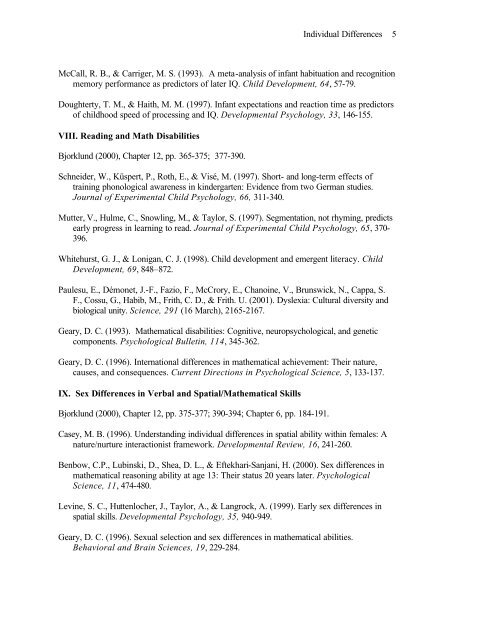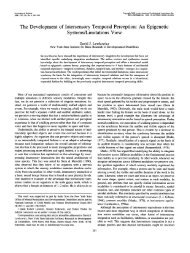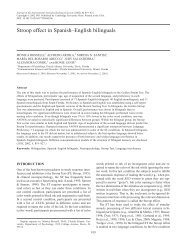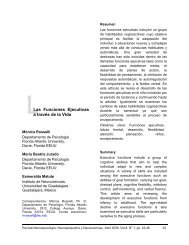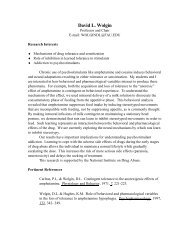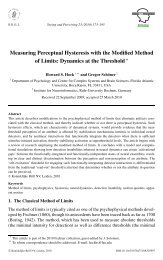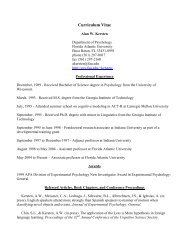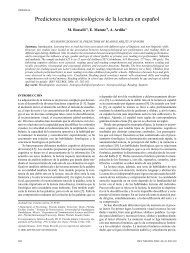Seminar in Individual Differences in Children's Thinking
Seminar in Individual Differences in Children's Thinking
Seminar in Individual Differences in Children's Thinking
You also want an ePaper? Increase the reach of your titles
YUMPU automatically turns print PDFs into web optimized ePapers that Google loves.
<strong>Individual</strong> <strong>Differences</strong> 5McCall, R. B., & Carriger, M. S. (1993). A meta-analysis of <strong>in</strong>fant habituation and recognitionmemory performance as predictors of later IQ. Child Development, 64, 57-79.Doughterty, T. M., & Haith, M. M. (1997). Infant expectations and reaction time as predictorsof childhood speed of process<strong>in</strong>g and IQ. Developmental Psychology, 33, 146-155.VIII. Read<strong>in</strong>g and Math DisabilitiesBjorklund (2000), Chapter 12, pp. 365-375; 377-390.Schneider, W., Küspert, P., Roth, E., & Visé, M. (1997). Short- and long-term effects oftra<strong>in</strong><strong>in</strong>g phonological awareness <strong>in</strong> k<strong>in</strong>dergarten: Evidence from two German studies.Journal of Experimental Child Psychology, 66, 311-340.Mutter, V., Hulme, C., Snowl<strong>in</strong>g, M., & Taylor, S. (1997). Segmentation, not rhym<strong>in</strong>g, predictsearly progress <strong>in</strong> learn<strong>in</strong>g to read. Journal of Experimental Child Psychology, 65, 370-396.Whitehurst, G. J., & Lonigan, C. J. (1998). Child development and emergent literacy. ChildDevelopment, 69, 848–872.Paulesu, E., Démonet, J.-F., Fazio, F., McCrory, E., Chano<strong>in</strong>e, V., Brunswick, N., Cappa, S.F., Cossu, G., Habib, M., Frith, C. D., & Frith. U. (2001). Dyslexia: Cultural diversity andbiological unity. Science, 291 (16 March), 2165-2167.Geary, D. C. (1993). Mathematical disabilities: Cognitive, neuropsychological, and geneticcomponents. Psychological Bullet<strong>in</strong>, 114, 345-362.Geary, D. C. (1996). International differences <strong>in</strong> mathematical achievement: Their nature,causes, and consequences. Current Directions <strong>in</strong> Psychological Science, 5, 133-137.IX. Sex <strong>Differences</strong> <strong>in</strong> Verbal and Spatial/Mathematical SkillsBjorklund (2000), Chapter 12, pp. 375-377; 390-394; Chapter 6, pp. 184-191.Casey, M. B. (1996). Understand<strong>in</strong>g <strong>in</strong>dividual differences <strong>in</strong> spatial ability with<strong>in</strong> females: Anature/nurture <strong>in</strong>teractionist framework. Developmental Review, 16, 241-260.Benbow, C.P., Lub<strong>in</strong>ski, D., Shea, D. L., & Eftekhari-Sanjani, H. (2000). Sex differences <strong>in</strong>mathematical reason<strong>in</strong>g ability at age 13: Their status 20 years later. PsychologicalScience, 11, 474-480.Lev<strong>in</strong>e, S. C., Huttenlocher, J., Taylor, A., & Langrock, A. (1999). Early sex differences <strong>in</strong>spatial skills. Developmental Psychology, 35, 940-949.Geary, D. C. (1996). Sexual selection and sex differences <strong>in</strong> mathematical abilities.Behavioral and Bra<strong>in</strong> Sciences, 19, 229-284.


